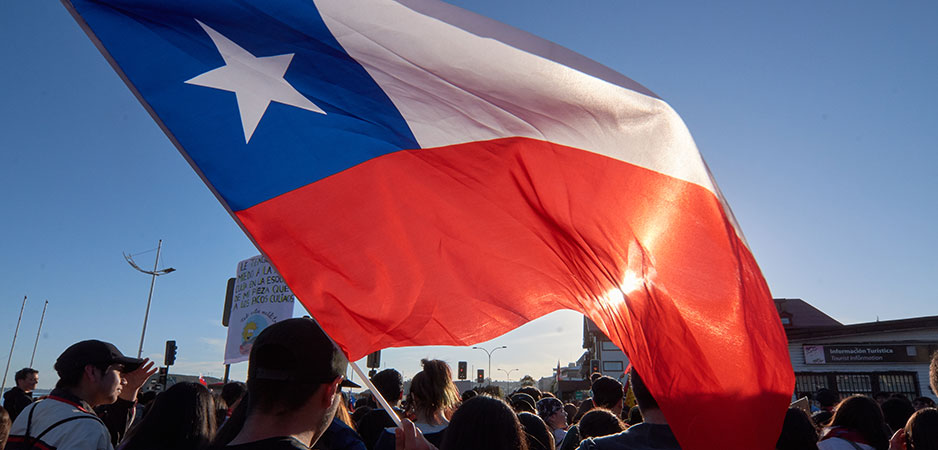Just as it seemed that the leftist “pink tide” had finally receded across Latin America, a wave of social movements are shaking market-friendly governments in the region. While certainly a reflection of the polarized political climate on a global scale, the recent convulsions across the continent deal a strong blow against the region’s maturing democratic institutions and serve as a reminder to foreign investors of the political risk that hangs over this attractive emerging market.
In recent weeks, the Chilean government has suffered the raucous consequences of announcing unpopular economic measures intended to rein in government debt and spending by increasing the cost of public services. In what has become a regional trend, protests in the capital Santiago began with a relatively small metro fare hike in early October. But the movement has since morphed into a widespread upheaval against neoliberal economic policies and social inequality in South America’s most prosperous nation.
Festering Grievances
Protests are nothing new for the Chilean people, and the grievances being revendicated — such as the lack of accessible basic social services, the discrimination against indigenous peoples and growing inequality — are legitimate. However, the level of coordination amongst some of the fringe elements and the main instigators of the last few weeks has left many wondering how truly spontaneous this movement is. Whether orchestrated, organic or both, the socioeconomic frustration felt by many Chileans has been accumulating for years as two presidents, Sebastian Pinera and Michelle Bachelet, alternated over four terms while dismantling much of the welfare state in order to attract foreign investment and positive credit ratings.
The seemingly excessive liberalization of the Chilean state economy has not been an issue as long as all social classes have shared, for the most part, in the country’s prosperity and growth. However, feeling increasingly burdened and unfairly taxed, the working and middle classes of Chile were ripe for a social uprising, unbeknownst to the country’s economic elite, political class and foreign creditors.
Amid mass protests, the government of Sebastian Pinera was forced to decree a state of emergency, which translated to curfews and martial law in several regions of the country. Perhaps a political miscalculation, for many Chileans who lived through the dictatorship of Augusto Pinochet the state of emergency only fired up their desire to protest.
Santiago has been the epicenter of demonstrations, including one that attracted more than a million people on October 25. Moreover, the protests have not been limited to the capital but have spread across other major cities such as Concepcion, Temuco, La Serena and Valparaiso. According to the United Nations, at least 20 have been killed and around 1,600 injured in the violence so far.
Like a Wildfire
Due to the sustained nature of the demonstrations, the national economy has begun to feel their effects. In that sense, international gatherings, such as the Asia-Pacific Economic Cooperation summit and the UN climate meeting, as well as cultural and sporting events, have either been canceled or relocated away from Chile. Similarly, domestic consumption, private business and public government infrastructure have all been dealt a severe blow by the unrelenting nature of this social wave.
Chile has not seen protests or public order mobilizations of this magnitude since the end of the Pinochet dictatorship in 1990. Moreover, given the country’s high level of institutional and socioeconomic development, the events of the last several weeks are even more shocking, having prompted calls for a UN human rights verification mission to be sent to Chile. Ironically, the UN’s current high commissioner for human rights is the former Chilean president, Michelle Bachelet.
While it would be unwise of global investors to flee from one of the world’s most attractive emerging markets, it would also be foolish of international capital not to protect itself against this regional tide of political risk. Instead of skyrocketing premiums, international brokers should seek to expand the pool by making political risk insurance more accessible and commonplace.
Political risk underwriters should be smarter as to the inputs that they consider when quantifying risk. For instance, a key consideration throughout Latin American should be the GINI coefficient, which indicates wealth inequality in a country, and the average increase in the standard of living of the middle and working classes over the last five years, particularly as these correlate to the impact on the middle and working classes of new economic policies and reforms.
With the possibility of a global economic slowdown on the horizon and the need to reduce high levels of public debt, right-wing governments throughout Latin America are implementing economic policies that hit the working and middle classes hardest, such as cutting subsidies, increasing the costs of public services and rolling back social welfare. For a region where the bulk of the population has seen an increase in its standard of living over the last two decades due to a commodities boom and the excessive spending by left-wing governments, any policy that threatens to worsen the average lifestyle of the population will meet fierce resistance.
The views expressed in this article are the author’s own and do not necessarily reflect Fair Observer’s editorial policy.
Support Fair Observer
We rely on your support for our independence, diversity and quality.
For more than 10 years, Fair Observer has been free, fair and independent. No billionaire owns us, no advertisers control us. We are a reader-supported nonprofit. Unlike many other publications, we keep our content free for readers regardless of where they live or whether they can afford to pay. We have no paywalls and no ads.
In the post-truth era of fake news, echo chambers and filter bubbles, we publish a plurality of perspectives from around the world. Anyone can publish with us, but everyone goes through a rigorous editorial process. So, you get fact-checked, well-reasoned content instead of noise.
We publish 2,500+ voices from 90+ countries. We also conduct education and training programs
on subjects ranging from digital media and journalism to writing and critical thinking. This
doesn’t come cheap. Servers, editors, trainers and web developers cost
money.
Please consider supporting us on a regular basis as a recurring donor or a
sustaining member.
Will you support FO’s journalism?
We rely on your support for our independence, diversity and quality.






